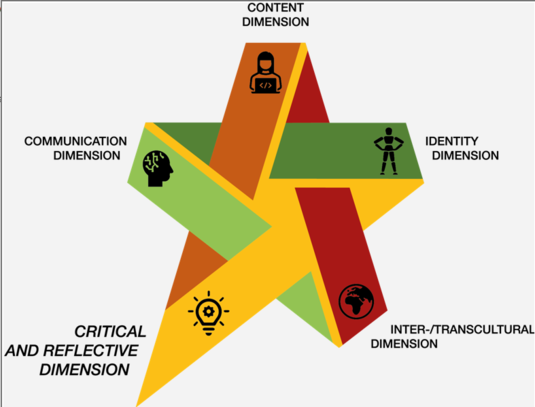Project

DiCE.Lang – Digital Citizenship Education and Foreign Language Learning – is a transnational European Erasmus+ Strategic Partnership (KA 203) project aiming to strengthen the profile of Digital Citizenship Education vis-à-vis Foreign Language Education.
What is Digital Citizenship Education?
Digital Citizenship Education (DCE) has emerged as a supranational priority, as has been strongly affirmed through recommendations issued by the Council of Europe. This educational initiative seeks to empower younger citizens to participate actively and responsibly in a digital society and to foster their skills of using digital technologies effectively and critically.
How can DCE be implemented in foreign language education?
In order to facilitate the implementation of DCE in schools and in curricula across Europe, subject-specific adaptations are required which, at moment, are still lacking. This would include a thorough adaptation of DCE principles and objectives into foreign language education (FLE) – a field at the heart of a unified vision of European education that involves the fostering of foreign language competencies needed for intercultural communication, mutual exchanges and civic action.
Against this backdrop, this three-year Erasmus+ project aims at modeling the specific perspectives of FLE into available European initiatives of DCE. This entails:
- Communication Dimension: Global and digital literacies which are necessary for digital citizens to communicate in the digital world, which includes a focus both on the language competence and the digital literacies necessary for learners to understand, interpret, manage, share and create meaning in the growing density of digital communication channels and online media;
- Inter- and Transcultural Dimension: Global and digital interaction are crucial components of digital environments where digital media serve as important transmitters of cultural knowledge;
- Identity Dimension: Global and digital participation to strengthen learners’ personalities with respect to their increasingly constant online presence and by considering the impact digital environments might have on their identity formation;
- Content Dimension: Global and digital contexts that relate current themes of our times to digital transformations (e.g. migration, diversity, sustainability); such current themes can also be framed as ‘global issues’, i.e. themes of more universal relevance that affect the world at large and that do not stop at national borders;
and finally, a transversal dimension with connections to either of the aforementioned categories: - Critical and Reflective Dimension: Awareness for global and digital diversity that makes it possible to reflect on the increasing digitalization of learners' life worlds.

To reach this large-scale objective, DiCE.Lang will conceptualize how DCE can best be implemented in FLE by providing novel pathways into educational resources, professional development, and policy updates. These trajectories will hinge centrally on quantitative and qualitative research activities that yield the backdrop for the whole project.

What outputs will be created by the project?
In detail, the project will produce four intellectual outputs:
- a survey to research teachers’ knowledge, skills and attitudes related to DCE, which will later be turned into a tool for teachers’ professional self-reflection
- a comprehensive set of open educational resources available in English and additional European languages
- a teacher training package for DCE in FLE providing various scalable opportunities for professional development
- a preliminary policy framework where we introduce readers to our theoretical-conceptual considerations that serve as a solid basis for all future discussions of the development of common digital and democratic values in the language classroom. The preliminary framework will serve as a valuable starting point for a joint European endeavor to intertwine foreign language learning and Digital Citizenship in sustainable manner
To ensure that all objectives and outputs are reached, DiCE.Lang will employ a rigorous methodology moving from a survey-based, state-of-the-art analysis to the cyclical piloting, improvement and implementation of all educational resources and teacher training elements, and then up to the research-driven conceptualization of a preliminary policy framework.
How will the results and outputs be disseminated?
The project follows a sustainable open-access policy to ensure widespread European outreach, coupled with local, regional, national and European dissemination activities that address the following cascade of target groups set to benefit from DiCE.Lang on the longer term:
- European and national stakeholders – with an expected impact of updating and transforming educational policies and curricula
- in-service foreign language teachers at schools and pre-service teachers in their teacher education phase at university – as involves their professional development and teaching practice
- teacher trainers as multipliers – who will in turn prepare other teachers for DCE in FLE
- ultimately, learners at school as the key beneficiaries of the project’s value chain and the recipients of the most up to date education involving digital citizenship while learning foreign languages
Additionally, the activities of this project group aim to directly impact 200 foreign language teachers equipped to teach DCE to roughly 4000 learners, as well as 50 expert teachers being trained to multiply DCE back into schools, and 40-200 student teachers per semester receiving DCE training for their professional futures.
Who is involved?
DiCE.Lang will be realized by a project consortium with experts from five European universities and research centers. Since digital citizenship at the intersection of FLE is truly a transnational European challenge, partners as diverse as Germany, Ireland, Italy, Latvia and Portugal will unite their various areas of expertise (e.g. foreign language didactics, citizenship pedagogy and digital education) into a shared project marked by both context-sensitivity and multi-perspectivity. This potential will generate educational innovations that strengthen today’s learners to become the citizens of tomorrow’s Europe in an era of digital transformation.


The creation of these resources has been (partially) funded by the ERASMUS+ grant program of the European Union under grant no. 2020-1-DE01-KA203-005712. Neither the European Commission nor the project's national funding agency DAAD are responsible for the content or liable for any losses or damage resulting of the use of these resources.



